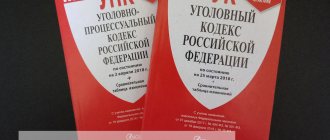How are damage caused determined and recorded?
Remember one important thing - if you want to prove the fact of causing any injuries, be sure to record them. The presence of a conclusion will be mandatory for contacting the police, prosecutor's office and court. In this case, damages need to be recorded only by doctors. It is impossible to independently describe the existing injuries and draw up a medical report, even if you are a certified doctor - the examination must be carried out by a third party.
Important
At the same time, it is not enough to record the damage itself. You will also need to provide other evidence. For example, filming an attack from surveillance cameras, video recorders, etc. Also, do not hesitate to involve witnesses. To do this, you can always contact the police.
What influences the punishment for causing damage to health?
When one citizen harms another, resulting in physical harm, minor injuries, and (temporary) disability, he must be held accountable. Any case of violence has its own individual characteristics and only the court can punish the offender.
To determine the article that a citizen violated when causing harm, an investigation is conducted to determine the circumstances of the crime and the nature of its consequences. Ultimately, the article under which a citizen will be sentenced or acquitted is determined by the court. In addition, a forensic medical examination must be carried out to determine the amount of harm caused.
Kinds
All possible bodily injuries are divided into three broad categories: mild, moderate, severe. Before defining each, we note an important fact - each injury is unique in its own way, and only a qualified specialist can determine the degree of severity. Moreover, even the same injury can be assessed by two doctors in different categories.
- Lungs. The most common category. These include any minor or short-term damage to health. In practice, they mean bruises, bruises, contusions, etc. Light injuries also include more serious injuries that “lasted” no more than seven days (that is, completely or substantially healed in less than a week);
- Average. The most extensive category, which, in fact, includes everything that is neither minor nor severe harm to health. This category often includes injuries that somehow affected the victim, but did not affect his health as a whole, as well as injuries that affected his general health for a significant period. In practice, bodily injury is almost any injury: fractures, severe burns, stab and cut wounds that do not affect organs, and much more;
- Heavy. Not as extensive as moderate damage, but much more varied. Grave damage includes any damage that causes significant damage to the health and psyche of the victim. Please note that serious bodily injuries most often lead to a deterioration in the victim’s mental state, and therefore, even if the damage was not significant, but affected the victim’s mental balance, the damage can be characterized as severe. In practice, severe damage includes anything that causes permanent consequences for the victim’s health, disability or death: beatings, torture, severe beating, stabbing, cutting or gunshot wounds and much more.
What distinguishes beatings from minor injuries?
The concept of “beating” differs from causing minor injuries in that in the first case there may be no scratches or bruises on the victim’s body. To bring the offender to justice, the sensation of severe physical pain is enough. When considering minor injuries, medical expertise is assumed.
Since obvious evidence of beatings may not be found, they use:
- video camera recording;
- witness statements;
- testimonies of people who provided assistance.
- examination recording the presence of headache.
The application is sent to the magistrate at the place of residence of the accused. The case is considered without a prosecutor, the applicant independently builds a line of accusation, and also provides the opportunity to close the case at any stage, that is, to withdraw his statement from the police station or court.
Aggravating circumstances
Most often, causing any damage is considered not as a separate crime, but as one of the aggravating circumstances. And sometimes it completely changes the article. Let's look at two examples .
- Extortion . Standard extortion does not involve causing harm to the victim’s health. And the maximum punishment for it is 4 years and a fine of 80,000 rubles. However, if grievous bodily harm was caused during extortion, the prison term can increase to fifteen years, and the fine - up to one million;
- Robbery . According to the Criminal Code of the Russian Federation, robbery is the open theft of property without causing physical harm. At the same time, Article 161 of the Criminal Code of the Russian Federation “Robbery” includes theft, during which minor injuries were caused to health. However, if violence was used during the robbery, resulting in the infliction of medium or grave harm, then the elements of the crime will change, and the robbery will “develop” into a robbery.
These two examples clearly show how inflicting even minor injuries can significantly affect the punishment for the crime committed.
Normative base
The main legislative act that determines the degree of guilt and subsequent punishment when causing certain injuries is the Criminal Code of the Russian Federation. But the nature of the loss of health or the severity of the injuries is determined not by the investigator or the judge, but by the forensic medical expert in a judicial or pre-trial manner on the basis of a resolution issued in accordance with the procedure specified in Article 196 of the Code of Criminal Procedure of the Russian Federation.
At the same time, the examination process itself takes place within the framework of the questions asked, reflected in the resolution.
The examination of the victim is carried out according to the criteria and rules approved by the following regulations:
- By Order of the Ministry of Health and Social Development of the Russian Federation dated April 24, 2008 N 194n;
- Decree of the Government of the Russian Federation dated August 17, 2007 N 522;
- By order of the Ministry of Health and Social Development of the Russian Federation dated May 12, 2010 N 346n.
Minor harm to health
This article of the Criminal Code of the Russian Federation, number 115, considers only light and minor injuries that did not lead to too serious consequences. This is a very short article with only two parts.
In the first part of Art. 115 of the Criminal Code of the Russian Federation deals with the infliction of minor bodily harm without any aggravating circumstances or features. Punishments may include:
- Fine up to 40,000 rubles;
- Compulsory work for 480 hours;
- 1 year of correctional labor;
- Arrest for 4 months.
In the second part of Art. 115 of the Criminal Code of the Russian Federation deals with causing minor injuries with various aggravating circumstances. Aggravating circumstances include:
- Injury for hooligan purposes;
- Political, religious or other motives;
- Use of any weapon;
The punishment for the second part is much more severe:
- 1 year of correctional labor;
- 2 years of restriction of freedom;
- 2 years of forced labor;
- 6 months of arrest;
- Imprisonment for two years.
Moderate bodily injury
Battery of moderate severity is a serious crime and carries a penalty of imprisonment. To qualify the actions of the batterer, a forensic medical examination of the beatings inflicted is carried out. Her findings confirm the need for treatment of the victim for at least three weeks.
Depending on the situation in which the bodily harm was inflicted, the judge's sentence may be increased (see punishment for beating a person).
For example , if two friends were beaten at the same time. Both were in hospital for 24 days, then the perpetrator may be sentenced to imprisonment for up to 5 years (instead of 3 years, which are provided for in Article 112 of the Criminal Code of the Russian Federation for beating one victim).
The same punishment (up to 5 years) awaits someone who used moderate violence against a child under 14 years of age.
Average harm to health
The legislation of the Russian Federation provides for a separate article responsible for the intentional infliction of injuries of moderate severity. It bears the number 111 and is divided into two parts.
In the first part of Art. 111 of the Criminal Code of the Russian Federation deals with the process of intentionally inflicting bodily harm of moderate severity without any aggravating circumstances. This is a very serious violation and will be punished accordingly:
- 3 years of restriction of freedom;
- 3 years of forced labor;
- Arrest for 6 months;
- 3 years imprisonment.
The second part of Article 111 of the Criminal Code of the Russian Federation is much more extensive. She considers the following circumstances:
- There are two or more victims;
- The victim is a minor;
- The harm was caused by a group of people;
- The harm was caused for hooligan reasons;
- The criminal used his official position;
- When causing harm to health, a weapon was used;
- The harm was caused on the basis of religious, national or other hostility.
Info
In any case, the punishment for the crime provided for in the second part of this article is the same for all counts - imprisonment for a term of up to five years.
Criminal liability for assault
Please note that in connection with new amendments to the Criminal Legislation of the Russian Federation, the following types of bodily injuries are recognized as battery:
- Beating of immediate relatives;
- Hooligan motive for committing a crime;
- The injuries were inflicted by a previously convicted individual;
- The offender acted out of hatred (religious, racial or national).
It also takes into account that the beating must have caused serious health problems or temporary impairment. The absence of traces of damage or too late contacting the police are not grounds for initiating a case under Art. 111, 112 and 115 of the Criminal Code of the Russian Federation.
Author of the article
Dmitry Leonov
Work experience 15 years, specialization - housing, family, inheritance, land, criminal cases.
Author's rating
721
Articles written
712
about the author
Useful information on criminal cases
- Humiliation of honor and dignity Criminal prosecution for libel
- Article for libel on the Internet
- False report of rape
- Defense against libel
- Charge of libel
- Theft accusation without evidence
- Sue for personal insult
- Personal insult complaint
- Fine for libel
- Liability for slander of an official
- Violent actions - Article 132 of the Criminal Code of the Russian Federation
- If the boss yells and humiliates: where to complain?
- Insulting a minor child: article
- Neighbor threatens violence: what to do
- Responsibility for violation of confidentiality of correspondence
- Libel lawsuit
- Punishment for public insult to a person
- Does a teacher have the right to insult a student?
- Infringement of the rights of minor children
- Attempted rape
- Blackmail on the Internet - Article 163 of the Criminal Code of the Russian Federation
- Rape charge
- Responsibility for non-payment of wages
- Criminal liability for violation of privacy
- What to do if you receive threats over the phone
- Punishment for knowingly false testimony
- Sample statement about threat to life
- Insulting a police officer while on duty
- Resisting a police officer - article
- Negligence of doctors article of the Criminal Code of the Russian Federation
- Illegal restriction of freedom of movement
- Damage to common property in an apartment building
- My wallet was stolen, what should I do?
- Criminal liability for vandalism
- What to do if your husband beat you?
- How much do they pay for killing a person?
- Bank fraud
- Possession of narcotic drugs
- Copyright Law
- Punishment for a bribe





